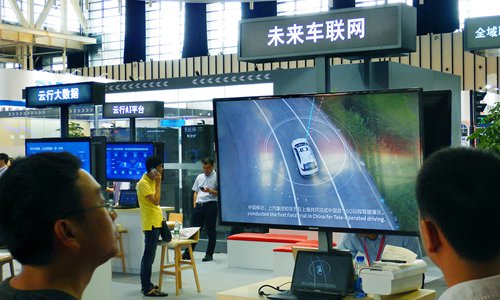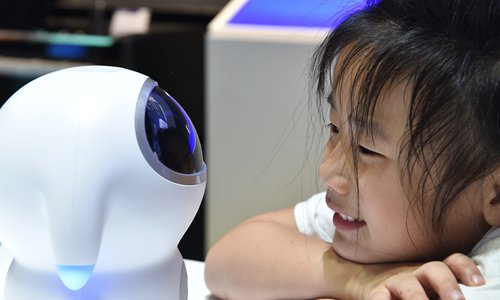
From the People’s Daily app.
This is Story in the Story.
China's State Council understands the significance of AI applications to decrease costs, empower economic growth and even bring transformation to industries in the coming era. The council revealed its ambition in July 2017 to develop an AI industry worth 1 trillion yuan ($145.7 billion) and become the world's leading AI innovation hub by 2030.
The Chinese government is providing supportive policies and funding to the industry, encouraging a great number of start-ups in the field. AI is becoming a buzzword that attracts capital.
A 2018 CB Insights study shows that the funding for China's AI start-ups surpassed that in the US for the first time in 2017. Some $15.2 billion went to AI start-ups last year and 48 percent of the funding was for Chinese firms.
Liu Duo, president of the China Academy of Information and Communications Technology (CAICT), and also secretary general of the Artificial Intelligence Industry Alliance (AIIA), said at the China Artificial Intelligence Summit in Nanjing recently that according to incomplete statistics, there were 848 AI companies in China by 2017, which held a market size of 21.7 billion yuan.
However, a large amount of capital going to AI industries may lead to an investment bubble that quickly collapses.
Although media reports warn the AI industry is experiencing a bubble, experts said that the market is cooling down and investors are soberer this year compared to 2016 and 2017, leaving the industry to develop in a normal way.
Today’s Story in the Story will look at the future of AI in China, including how second-tier cities hope to ascend to top tier by developing AI industry, and how China's AI market has cooled off as investors become increasingly sober.

Products of AI technologies and big data, including facial recognition, drones and an AI robot driving coach, are displayed at an exhibition in Nanjing, East China's Jiangsu Province on August 10. (Photo: VCG)
Huang Wei's son sleeps every night with an AI robot developed by Huang. The young boy plays with it every morning when he wakes up, because Huang and his wife are both very busy.
As the CEO of the Beijing-based artificial intelligence start-up Unisound, known in Chinese as Yunzhisheng, Huang said the idea of developing an AI robot for children came from his experience as a father. The robot helps children practice oral communication skills and teaches them Chinese poems. Huang's son now enjoys spending a great amount of time with it.
In addition to attracting top technology talent with enticing rewards, many cities are holding AI-related conferences for professionals, investors and media.
Zhang Yicong, a senior analyst at financial data service provider Jingdata, said that some second-tier cities hope to find opportunities to ascend to the first-tier, with the assistance of either innovative business models, or technology innovation.

A girl from Hefei, East China's Anhui Province plays with an AI robot on July 22. (Photo: VCG)
For instance, Hangzhou, a city in East China, is becoming a top-tier city because the headquarters of Chinese digital conglomerate Alibaba Group is located there, Zhang said.
Transforming to "smart cities" with the assistance of AI can take those cities to the "fast lane," Zhang added, and officials in municipal governments are daring to take a risk on developing cutting-edge technology in order to gain achievements in their career records.
Xiong Weiming, a partner of China Growth Capital, said that the AI industry is reminiscent of the Groupon craze in previous years.
The vast herd of investors and government funds are very passionate, while first-tier investors are cautious. The success of leading AI companies has led to many start-ups following the trend.
Talking about whether China's AI industry is overheated, Andrew Ng, co-founder of Coursera, and former head of Baidu AI Group and Google Brain, said that we cannot judge whether the industry is overheated or not since some start-ups have succeeded, and some have not.
The deciding factor in the AI competition between China and the US will be talented people.
In addition to government funding to firms, China is now attracting more AI talent to work in the country with decent pay and good benefits, such as housing and bonuses.
Xu Tao, director of the International Cooperation and Exchanges Department at the Ministry of Education, told the China Daily in April that 10 Chinese universities have set up AI-related majors. And the ministry said in March that 283 universities are licensed to offer data science programs.
In July, 26 universities applied jointly for setting up AI majors in undergraduate education, making it easier for younger Chinese students to study AI.
(Produced by Nancy Yan Xu, Raymond Mendoza and Lance Crayon. Music by: bensound.com. Text from Global Times and People’s Daily.)


